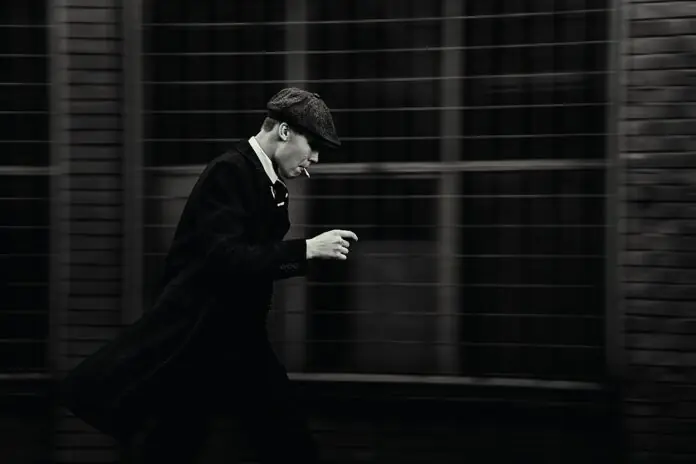In the smog-laden skies over post-World War I Birmingham, amidst the clatter of factories and the sharp clang of metal, emerges a figure both formidable and enigmatic—Thomas Shelby. As the central character of the acclaimed British series “Peaky Blinders,” Tommy Shelby, portrayed with brooding intensity by Cillian Murphy, is a study in complexity and contradiction, embodying the tumultuous spirit of the times.
Tommy Shelby is not merely a character; he is an experience, an enigma wrapped in the tweed of a bygone era, yet resonating with audiences across generations. At first glance, he is the epitome of a ruthless gangster, leading the Peaky Blinders with an iron fist and a razor-edged cap. Yet, as the layers peel away, we discover a man haunted by the ghosts of the Great War, a visionary entrepreneur, a loving yet troubled family man, and, at times, a reluctant romantic.
The brilliance of Tommy Shelby lies in his multifaceted nature. He navigates the murky waters of Birmingham’s criminal underworld with the precision of a chess master, always thinking several moves ahead. His intelligence and strategic acumen are matched only by his fierce loyalty to his family and his unyielding ambition to rise above his station. Despite his criminal endeavours, Tommy’s quest for power is not driven by greed but by a deep-seated desire to protect his loved ones and secure their future in a world that has been cruel and unforgiving.
Tommy’s complexity extends to his moral compass, which, while skewed, is guided by a code of honour that sets him apart from the conventional villain. He is a man capable of extreme violence, yet he is also shown to possess a profound sense of justice, often using his position to right the wrongs he perceives in society. His interactions with his family, particularly his brothers Arthur and John, and his aunt Polly, reveal a man struggling with the dualities within him, teetering on the edge of darkness yet seeking redemption in love and ambition.
The psychological depth of Tommy Shelby is a testament to the show’s writing and Murphy’s performance. We see the scars of war not only on his body but in his soul, manifesting in moments of vulnerability that are quickly masked by a return to the stoic leader. His love interests, from Grace to Lizzie, serve as mirrors to his evolution, reflecting the possibility of salvation through love and the constant pull of his darker instincts.
Tommy Shelby’s Birmingham is a character in its own right, a post-war landscape of opportunity and despair, where the lines between friend and foe, legal and criminal, are blurred. In this world, Tommy emerges as a symbol of resilience and defiance, a man who refuses to be defined by his circumstances. His vision for a better future, one where the Shelbys no longer live under the shadow of their deeds, drives the narrative forward, making us root for him despite our better judgment.
In conclusion, Thomas Shelby is more than just a fictional character; he is a portrait of a man walking the tightrope between darkness and light. “Peaky Blinders” offers us a window into his soul, revealing a character so richly drawn that he lingers long after the screen fades to black. In Tommy Shelby, we find the embodiment of the human condition—flawed, resilient, and endlessly fascinating.
